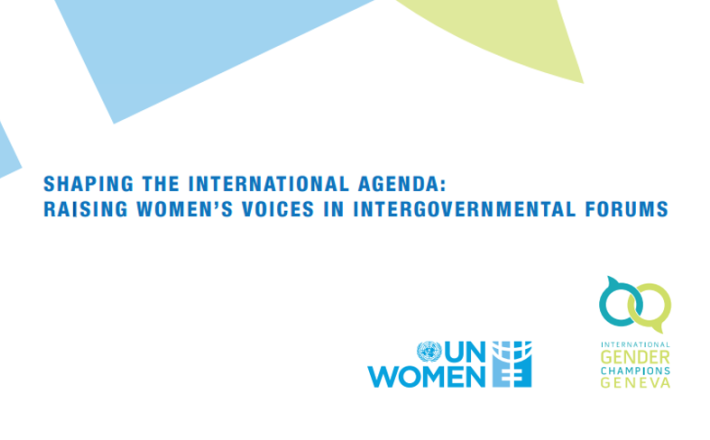Shaping the International Agenda: Raising Women’s Voices in Intergovernmental Forums
Business as usual is not an option. To fulfil the 2030 Agenda for Sustainable Development, including Sustainable Development Goal 5 on achieving gender equality and empowering all women and girls, concrete actions and intensified commitments to improve women’s participation and representation are needed.
In early 2016, the International Gender Champions–Geneva started to look closely at the number of women in delegations to governing bodies of Geneva-based international organizations. At its annual meeting in 2016, the United Nations Governing Bodies Secretariat further discussed gender balance in the governing bodies of international organizations and agreed to support efforts to promote women’s participation and advance the goal of gender balance across their conferences and meetings.
This publication aims to build knowledge on women’s participation in national delegations to meetings of international organizations’ governing bodies and their leadership roles in these meetings. It is based on responses to a questionnaire addressed to members of the United Nations Governing Bodies Secretariat and of the International Gender Champions–Geneva. Although the results of the survey may not be representative of all United Nations organizations, they have yielded important information on the current policies and practices in the 23 entities that took part.
Based on the responses, six types of actions to improve women’s participation in governing body meetings have been identified: (a) explicit policies and mandated targets; (b) tracking and reporting; (c) training and capacity-building; (d) financial support; (e) advocacy and networking; and (f) communications strategies.
The survey results are complemented by an overview of intergovernmental and inter-agency frameworks and trends in women’s participation in national Governments and intergovernmental forums. Best practices in promoting women’s participation at different levels – national and multilateral – are also presented with the aim of informing concrete recommendations on the way forward to realize gender balance in international organizations’ governing bodies.
Click here to access the publication.

Business as usual is not an option. To fulfil the 2030 Agenda for Sustainable Development, including Sustainable Development Goal 5 on achieving gender equality and empowering all women and girls, concrete actions and intensified commitments to improve women’s participation and representation are needed.
In early 2016, the International Gender Champions–Geneva started to look closely at the number of women in delegations to governing bodies of Geneva-based international organizations. At its annual meeting in 2016, the United Nations Governing Bodies Secretariat further discussed gender balance in the governing bodies of international organizations and agreed to support efforts to promote women’s participation and advance the goal of gender balance across their conferences and meetings.
This publication aims to build knowledge on women’s participation in national delegations to meetings of international organizations’ governing bodies and their leadership roles in these meetings. It is based on responses to a questionnaire addressed to members of the United Nations Governing Bodies Secretariat and of the International Gender Champions–Geneva. Although the results of the survey may not be representative of all United Nations organizations, they have yielded important information on the current policies and practices in the 23 entities that took part.
Based on the responses, six types of actions to improve women’s participation in governing body meetings have been identified: (a) explicit policies and mandated targets; (b) tracking and reporting; (c) training and capacity-building; (d) financial support; (e) advocacy and networking; and (f) communications strategies.
The survey results are complemented by an overview of intergovernmental and inter-agency frameworks and trends in women’s participation in national Governments and intergovernmental forums. Best practices in promoting women’s participation at different levels – national and multilateral – are also presented with the aim of informing concrete recommendations on the way forward to realize gender balance in international organizations’ governing bodies.
Click here to access the publication.